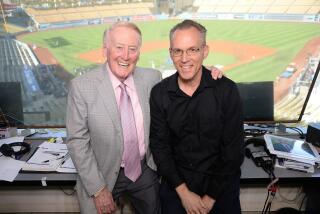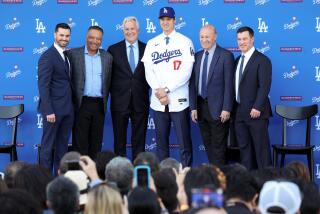MIKE FLANAGAN : Ex-Oriole Pitcher Wore Every Mask of Success and Failure with Equal and Quiet Grace
- Share via
WASHINGTON — In the battle to master ourselves, we often are overmatched and don’t know why. A lifetime of doubts manacles some of us. Others walk almost free.
Some, like Mike Flanagan, hardly know their own strength and persevere when those around them would give up. That they not only endure through injury and bad luck, but do so with good cheer and a helping hand, seems as easy to them as it is remarkable to others.
Some, like Alan Wiggins, can turn good fortune into disaster, ignore those who would be their friends and see in an instant all those who might be foes. That they fail in the midst of health and wealth, and do so with a scowl, seems as infuriatingly inevitable to those around them as it is saddening.
No Oriole was ever better liked or more respected than Flanagan, who was traded to the Toronto Blue Jays last Monday. For 15 seasons, from Class A ball to a Cy Young Award to a world championship season to a torn Achilles’ tendon to the scrap heap of age and injury, he was smart, funny, tough, self-effacing and a team player, even to the point of damaging his own career; in the locker room world, that’s like hitting the Irish Sweepstakes.
Flanagan wore every mask of success and failure with equal and quiet grace--handling the failure, perhaps, even better than the success. New England stoicism and sardonic humor seemed to steel him for long rehabilitations, miserable pitching luck and non-support. No Orioles pitcher had so many disabling injuries, so few runs to work with or so many wins squandered by relievers.
With a four-pound knee brace that made him an almost comic figure, he started crucial Baltimore victories in both the ’83 playoffs and World Series. So great was the respect for a pitcher who never knocked down a hitter, never took his spitter out of the bullpen and made a point of honor of challenging hitters’ strengths that, even for the highest stakes in the sport, no one attempted to bunt on him. Flanagan stood for fairness. Nobody took advantage of him.
No Oriole has ever had a tougher time in the clubhouse than Wiggins, who, also last Monday, was banned from the team for failing a drug test. That his career obviously is in jeopardy is the least of his problems. On paper, Wiggins played as well in Baltimore as he ever did in San Diego--a .270 average and 51 steals in 537 at-bats in 1985 and 1986 combined. Yet, the bitter verdict of former manager Earl Weaver was his Oriole epitaph.
Once, Wiggins went into Weaver’s office to complain about being benched. “He asked why he wasn’t playing,” recalled Weaver. “I told him, ‘You aren’t playing because you are the worst player I have ever managed in 35 years. You don’t understand the game well enough to know how bad you are.’ ”
Yet, in one unsettling way, Flanagan and Wiggins were alike; they were the team’s most avid readers. Both came from educated, middle-class families. Both saw themselves as smart men first and athletes second. In Flanagan’s locker: “Bright Lights, Big City.” In Wiggins’: “Malcolm X.”
“Alan was an enigma,” said Flanagan. “He seemed to have some deep-rooted problems. He was so smart about some things and definitely not smart about others. I tried to get closer to him two or three times, but you found yourself backing off for the sake of avoiding controversy.
“I always tend to give people two or three more chances than they deserve. That might help you in the long run, because then they give you more chances, too. Maybe Alan gave everybody two or three less chances than they deserved. So they gave him no chance at all.”
One man, however, gave Wiggins more chances than the Orioles could believe. Owner Edward Bennett Williams saw Wiggins’ talent and intelligence. He couldn’t resist the reclamation project. But it was a disaster. A clubhouse is a tough place, especially when a team is losing and blame hangs in the air. Wiggins’ huge salary and history as a two-time drug loser made him conspicuous. To make matters worse, the vulnerable Wiggins met arguments more than halfway.
The sad result was that Wiggins made it worth people’s while not to take the trouble to get to know him. Now, at a time when Wiggins desperately needs best wishes, most Orioles will try to forget him as quickly as possible.
It’s Flanagan who was sent off with high-fives from his teammates. “I didn’t know what to expect from them,” he said. “They were really happy for me. A lot more excited than I was. I was so sad to go. Really, my agent, Jerry Kapstein, had to spell it out for me in plain and simple language before I’d accept the trade.”
What Kapstein told Flanagan was that he didn’t fit in Baltimore’s plans and that, if he didn’t accept the Blue Jays’ one-year, $625,000 contract extension, Flanagan would probably wake up next opening day in retirement. Go to Toronto and win the pennant. Or stay in Baltimore and perhaps get released. Who but Flanagan would think that a tough choice?
“It’s a career rejuvenation, all right,” said Flanagan, who was 139-109 as an Oriole. “I have to admit, 200 wins crossed my mind. I love to pitch in Toronto. The mound is comfortable to me. I don’t mind cold. On AstroTurf, the infielders can play deeper. That helps me; I don’t throw a lot of fly balls.
“The first thing my dad said was, ‘They got a great pen.’ I always envied Ron Guidry. A strong bullpen can make it a six- or seven-inning game. And now (at age 35) I need that more than ever.”
Old reborn southpaws, who go on forever, are such a baseball institution that Flanagan fans are allowed to think of Tommy John, 12-4 at age 44.
“I had to be in Toronto before midnight (Sept. 1) to be eligible for the playoffs and World Series,” said Flanagan. “Toronto sent a charter jet just for me. Classy move.”
It was still a race.
“We settled (the contract) at 7:30 p.m. I was still in my Oriole uniform. Guys were coming in from the bullpen and ducking back between at-bats to congratulate me. I had to run home, get clothes and hurry to the airport. Then we had to fly around a couple of storms. We didn’t land until 11:40.
“After I got through customs and signed my (Canadian) working papers, I looked at my watch. It was five minutes to midnight,” said Flanagan. “Think maybe my luck is changing?”
Baltimore made a sound decision to deal Flanagan for young Oswald Peraza. Someday, Peraza may help pitch the Orioles to a World Series. But (and why not venture a prediction in so worthy a cause) by that time, Mike Flanagan already will have been there.
More to Read
Go beyond the scoreboard
Get the latest on L.A.'s teams in the daily Sports Report newsletter.
You may occasionally receive promotional content from the Los Angeles Times.










